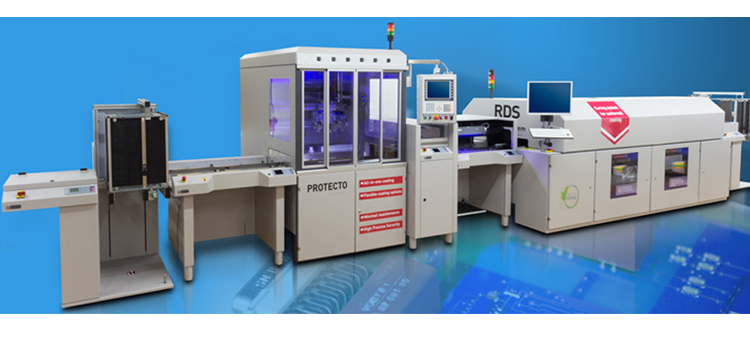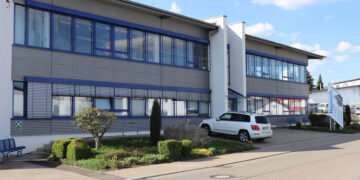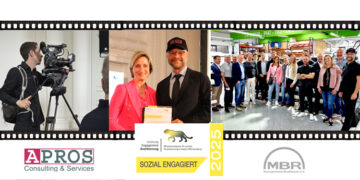Conformal Coating – Line Concept from Rehm Thermal Systems
Despite the growing challenges it is facing, Conformal Coating is becoming more and more important. As printed circuit boards become smaller and smaller, the challenges faced when coating them grow. It is increasingly important that products are protected from damage from moisture, dust and other dirt, as this can lead to interference and even cause the board to fail.
In the protective coating process (Conformal Coating process), printed circuit boards are protected from dust and environmental factors by applying a targeted protective coating, thus ensuring their reliability. Being able to protect electronics is of critical importance in sectors where faultless function is essential.
Theoretically, any assembled circuit board can be coated, although, depending on the plant system, the size of the board and how it is arranged may need to be reviewed beforehand. Because of the very technically complex challenges and the extreme climatic changes involved, protective coating is essential in air and space travel, ship building, automotive engineering and military technology. But this coating is also very useful to protect the function of products with printed circuit boards that come into contact with dirt or other environmental factors. Therefore the coating is used in all branches of the electronics industry, such as alarm technology, telecommunications, industry controls, traffic technology, railway technology, medical engineering, food engineering and many other areas.
To implement the Conformal Coating Line, as well as the coating equipment itself, handling equipment and a drying or annealing oven are also needed. It is important to have a detailed, regulated temperature profile to prevent blistering or other flaws in the surface of the coating material.
The first step in Conformal Coating is choosing the coating material. Several factors must be considered, including the protection required, whether the selected coating can be processed in the line considering its application, drying and cycle time and its cost effectiveness. Popular coatings are epoxy, urethane, silicone and acrylic based. Choosing the right coating requires a lot of experience and technical knowledge and is an almost impossible decision for anyone except an expert. After choosing the right coating materials to fit the mechanical, chemical and electronic requirements of the board, the core Conformal Coating Line process, the coating process itself, can begin. There are different methods for applying the coating on to the board, such as squirting, spraying, dipping, flooding, dispensing and vapour depositing.
As most printed circuit boards contain components that cannot be coated, the modern standard is selective spray coating. Diverse parameters must be considered, as not every coating can be applied with every process. One problem, for example, is that many of the nozzles in selective spraying equipment become clogged quickly, so highly viscose coatings cannot be used and changing coatings can be problematic. Another important factor is the layout of the board, which should be designed for coating beforehand to ensure the most effective and cost-efficient coating. This is because the spaces in very high or tightly packed circuit boards cannot be sprayed with every nozzle. After the protective coating has been applied, the next step is the drying process. This process should take place at a regulated temperature profile so that the results can be reproduced and are reliable. Incorrect temperature profiles or hardening the coating too quickly can lead to several faults, such as blistering, holes or the orange peel effect. It is clear that protective coating is both crucial and complicated.
Because of the complexity and the interaction of the individual parameters and processes, it is vital that the customer agrees on the desired result and the best solution for each end product with the equipment manufacturer and material supplier. To ensure that this solution is found, in addition to the RDS drying plants, Rehm now offers a complete coating line as a general contractor. This unique offer is made in cooperation with Rehm’s partner and an external handling supplier. Customers will profit from Rehm’s 25 years of experience in machine engineering and more than 37 years experience in working with protective coatings in the area of Conformal Coating from our partner. Therefore we are able to offer our customers expert professional support in all relevant areas, namely high quality machine engineering, experience and process know how in drying applications and applying protective coating. Furthermore, Rehm is offering on-site service, technological advice and all relevant components from one source.
Large companies requiring a wide range of coatings and also producing a large volume need quick reaction times, so it is therefore more cost-efficient to have the equipment in house to be able to adjust perfectly to market demand. The Conformal Coating Line from Rehm is ideal for these companies with high production volumes, due to its ability to reproduce optimum results and the speed at which these results can be produced.





